As the match clock ticked into the final 10 minutes of WXV 1 at BC Place, the television cameras panned to the respective coaches’ boxes.
While tension enveloped both, with England recently restored to 15 players and holding a slender 14-12 advantage against Canada, the faintest hint of a smile stretched across John Mitchell’s face.
The Red Roses were in danger of losing an unbeaten run that dates back two years, to the last Women’s Rugby World Cup final, but this was the test that Mitchell, his coaching staff and the players wanted. Had yearned for even.
It is all well and good winning matches at a canter but to paraphrase the Red Roses head coach, the real lessons come when you are pushed to the edge.
“There’s a lot of goodness in winning often,” Mitchell said after Zoe Aldcroft’s late converted try confirmed a 21-12 win and a second successive WXV 1 title. “It’s cool, but you also need to identify what are the problems when you win often as well.”

Coming almost a year to the day since Mitchell first joined up with the squad in a full-time capacity, in New Zealand last October, victory was a fitting way to end what has been another impressive 12 months.
The Red Roses will start 2025 on a 20-match winning run and with an all-time high rating at the top of the World Rugby Women’s Rankings.
Mitchell’s side will be heavy favourites to claim a record-equalling seventh successive Women’s Six Nations crown in April and they are on course to break their own benchmark of 30 consecutive Test victories during their home World Cup.
But Mitchell has been brought in to win one match above all else. Those milestones will be forgotten if he cannot deliver a third World Cup trophy on 27 September next year.
So, how has the team developed under their Kiwi head coach and where do they stand in their quest to overcome their painful showpiece defeats of the past?
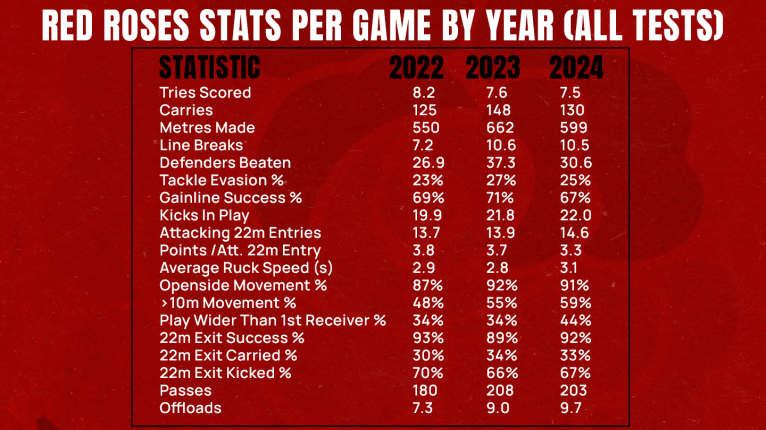
Mitchell might have been delayed in taking up his post as Red Roses supremo by his commitments with Japan’s men’s team but England’s evolution in attacking shape started before he had been appointed.
Lou Meadows interviewed for the head coach position and although she missed out on that role to Mitchell, her plans for the team impressed the power brokers at the Rugby Football Union.
Meadows, who had only recently returned to the RFU as U20s head coach, was offered the opportunity to become Red Roses attack coach on the eve of their Grand Slam decider against France last April.
The following day she came face-to-face with the possibilities of her impending role as she took her place among 58,498 fans at Twickenham and watched England secure a seesaw 38-33 victory and another Six Nations title with it.
“It was surreal because I was obviously sat there watching the game, a record crowd in terms of numbers, and I was just like, ‘this is amazing, I’m about to be part of this’,” Meadows tells RugbyPass.
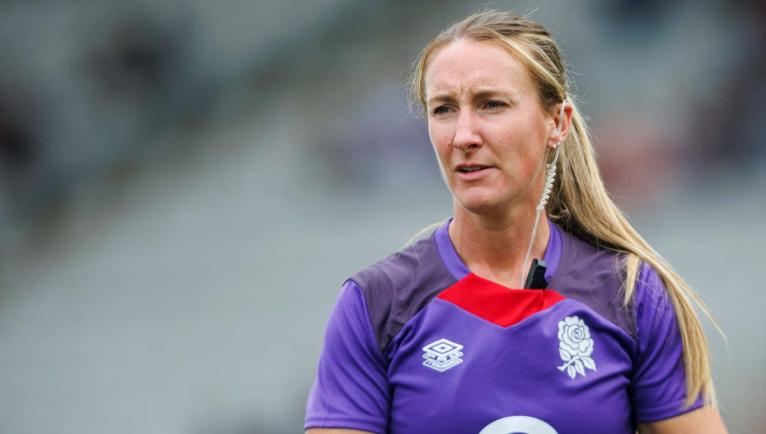
“But even then, I couldn’t take my coaching hat off because I was watching it going, ‘oh, I could do this. I could do that, and I would do that’. My brain was getting really, really excited about the opportunity I was about to be presented with.”
What Meadows had outlined in her RFU interview – and this will not come as a huge surprise to those who follow England – was a belief that the Red Roses had become too one-dimensional.
“I thought they were far too prescriptive, really obvious in what they were doing,” she adds. “Obviously they were still really successful but I said teams are going to start coming after those particular areas because it’s clear what’s going on.
“I said as teams progress and they will develop, we need to get smarter, and we need to be able to switch up in what we’re doing. And we also need to make sure we’ve not got one player on our team that they can shut down and then it shuts down the rest of the attack.
“And so, I brought a few ideas to the table around that about how to go after this ‘one team’ concept, improve everyone’s skill-sets, being able to spread them across the park and have them play in different areas of the pitch.
“And then just the showcase of being able to score a variety of tries and how exciting that will be not only for the game but for the players to get after.”
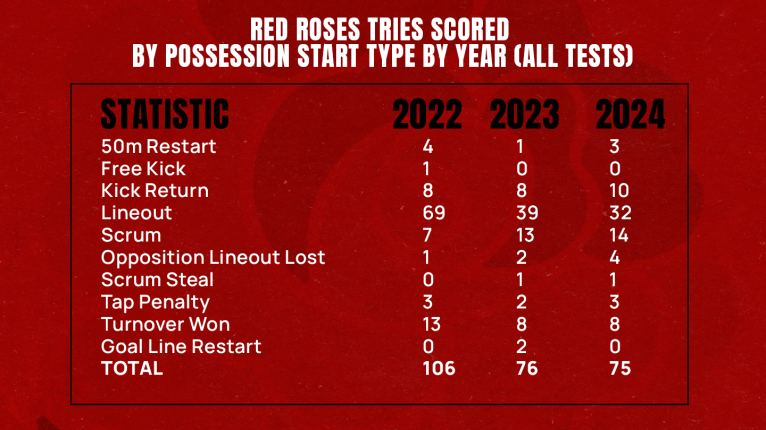
Following phone calls and Zoom meetings with Mitchell in Japan, the pair narrowed in on what they wanted the England attack to look like ahead of their inaugural WXV campaign.
Although Louis Deacon was officially interim head coach for the warm-up matches and tournament in New Zealand, Mitchell provided a framework of how he wanted the team to play.
“But he gave us loads of opportunity to collaborate in that space and ownership of exactly how to coach it,” Meadows adds.
“I think that was the real interesting part with him, was that he was really, really keen for us to put our own stamp on things.”
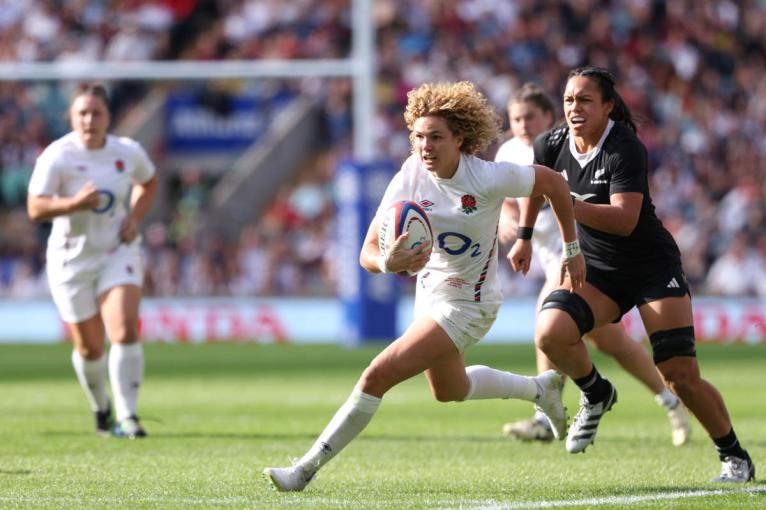
It is only natural that having had so much success playing a certain way, some players would take more time to be won over by the ‘one team’ concept.
Moreover, the all-court style that Mitchell and Meadows envisaged the Red Roses playing – taking the handbrake off – demands an extremely high base level of fitness.
“The way we wanted to use the players and then the physical development we needed in that space was probably going to be the hardest part,” she explains.
“Because it was basically like, ‘this is really exciting’, and they could see how we wanted to play the game but ultimately their bodies have to be in a position to allow us to do that.
“So that was the tougher side of the coin because we want to play fast, and we want to have a really good skill-set.
“We want to be able to score tries in multiple ways and then equally on the other side of the ball, we want to be extremely physical and dominant in that space.”
Meadows admits some players “needed to see it and try it” to understand what the coaches wanted to achieve but England’s underlying numbers suggest the message has been received.
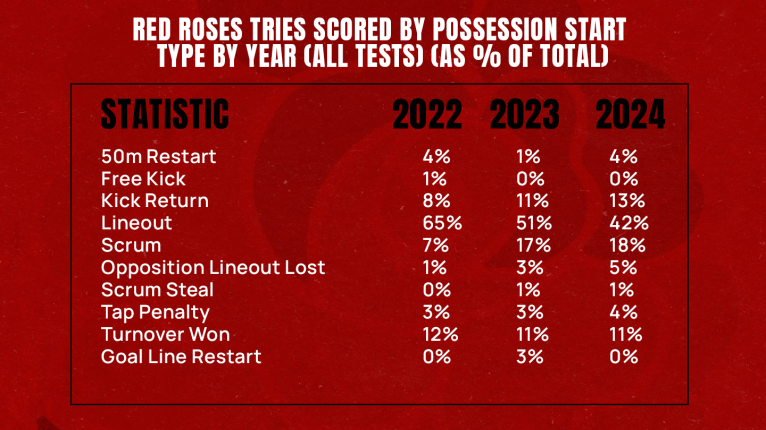
According to data provided by Opta, although England are scoring roughly the same number of tries – 7.5 per match in 2024 compared to 8.2 in 2022, Simon Middleton’s last full year in charge – the source of those scores has changed.
While the lineout is still used as an attacking weapon, contributing to 42 per cent of tries this year, that is down markedly – from 65 per cent two years ago.
In that time the scrum has become more pivotal, providing the base for 18 per cent of the team’s tries in 2024, up from just seven per cent in 2022.
Moreover, more than half of the Red Roses’ tries this year were scored from attacks of at least three phases, ten per cent coming from moves of nine phases or more.
For context, 54.4 per cent of the tries England scored in 2022 came from only one.
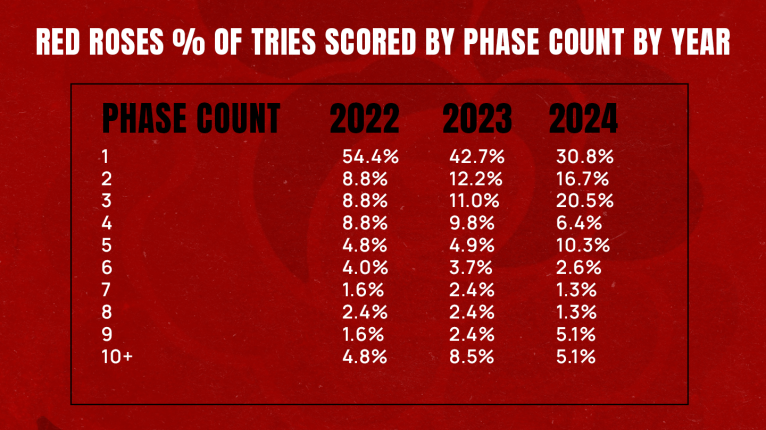
Unsurprisingly, the statistics also show that the Red Roses are playing wider with 44 per cent of attacks continuing beyond the first receiver – up from 34 per cent two years ago – and both line-breaks (10.5 per match this year) and offloads (9.7) up considerably.
And it is not only on the pitch where the players are being encouraged to express themselves.
Ellie Kildunne and Jess Breach are among those who have felt empowered to pursue outside interests while the sight of Mitchell being lured into TikTok pranks suggests a relaxed atmosphere.
“It’s a breath of fresh air,” Kildunne says. “The new coaching staff, they’ve come in with a blank sheet and they haven’t tried to be what we were.
“They’ve just let people be themselves and play to people’s strengths. There’s a strategy that might work, and it might have worked for years and years but also the team has changed.”
It is no mean feat to have reset the culture of a team so quickly, especially when you consider two of his most senior coaches – Deacon and Sarah Hunter – were such a big part of that previous success.
“A strong part of Mitch’s DNA is how much he cares about people and really wants to get to know them,” Meadows says. “That then allows him to push them as well.”
We’re in a learning phase and we’ve got some things right, we’ve got some things wrong. And I do think it’s the joy of the fact that it’s OK to get things wrong now and we can work on it.
Of course, that is not to say that everything is rosy in England’s garden. As they have strived to perfect their performance on one side of the ball, they have conceded territory and tries too easily on the other.
Over the past three weeks, USA have scored three tries against them, New Zealand five and Canada threatened more than the two they managed.
Before leaving for Vancouver, and following warm-up wins over France and New Zealand, one key word among the players and defence coach Hunter was ‘balance’.
Although, playing with the handbrake off can mean the same principles apply to England’s approach in defence as attack, as Abby Dow outlined after last month’s victory against New Zealand at Allianz Stadium.
“We’ve really had a big battle in our mindset when it comes to defence. We’ve really been fighting our boundaries,” Dow said.
“We want to become a team that every opportunity is exposed and used and there’s nothing left on the pitch.
“We’re in a learning phase and we’ve got some things right, we’ve got some things wrong. And I do think it’s the joy of the fact that it’s OK to get things wrong now and we can work on it.”

That is why the Canada win will have pleased Mitchell and his coaching staff so much. The Red Roses were tested defensively, played for 20 minutes with only 14 players, but came through the other side.
“We’ve got a couple of things we’ve got to sort out technically as a result of probably taking a little bit more risk in attack,” Mitchell conceded following Saturday’s victory.
Dow articulated something else as she chatted to reporters at Twickenham in the wake of that New Zealand match last month: the anxiety the Black Ferns, for all their current faults, still induce.
From England’s very first win in the fixture in 2001, the rivalry has been littered with Red Roses victories that ultimately counted for little more than pride.
That maiden success was followed 11 months later by defeat in the 2002 World Cup final and England have since beaten the Black Ferns in 2009, 2017 and 2021 – twice – only to lose when they subsequently met in the showpiece match at the RWC.
Of the five World Cup finals the teams have contested, New Zealand have won all of them.
Every team we respect and also in the nicest way possible you want to disrespect them, and you want to dominate. You want to crush what they’re trying to do.
It is why, for all England’s dominance over the past five years, that sole defeat in Auckland two years ago hurts so much and why the fear lingers that the Black Ferns will rise again next September.
“Sorry, what are you talking about?” Dow joked when asked whether there was a mental hangover from the most recent final defeat in particular.
“I would say yes and no. Every team we respect and also in the nicest way possible you want to disrespect them, and you want to dominate. You want to crush what they’re trying to do.”
The nine-try, 49-31 victory against New Zealand in Langley will have further exorcised those demons but it is positive that the Red Roses are engaging on such topics.
This is a team that feels it can still improve and is at least presently refusing to get swept up by their success. Instead, they are looking to learn from every situation they find themselves in.
Speaking to RugbyPass last month, Helena Rowland claimed England were “only touching the surface” in terms of their potential.
“What’s really exciting is that we’ve got a lot more to come,” she said. “That comes with playing as many games as we can, and I suppose just being brave with what we know we can do.”
In the pursuit of that progress, the door has also been left ajar for the introduction of new faces and talent on the road to next year’s tournament.

Georgia Brock, Lilli Ives Campion and Bo Westcombe-Evans have all made the step up to the senior squad while Fran Goldthorp’s recent switch to Loughborough Lightning from rugby league came with England’s approval.
“It’s absolutely crucial to the depth of our programme to make sure that we have got eyes across the game and on players such as her,” Meadows, who worked with Goldthorp at U20 level, says of the 21-year-old. “She will be in that wider player watch programme.”
None of which guarantees that England will end their home World Cup with the trophy raised above their heads, but you can be sure they will leave nothing to chance in their quest for glory.
“We’ve got to continue to keep learning,” Mitchell said on Saturday. “We’ve got to continue to get better.”
That is a scary thought for any team preparing to face the Red Roses between now and next September.


Comments
Join free and tell us what you really think!
Sign up for free